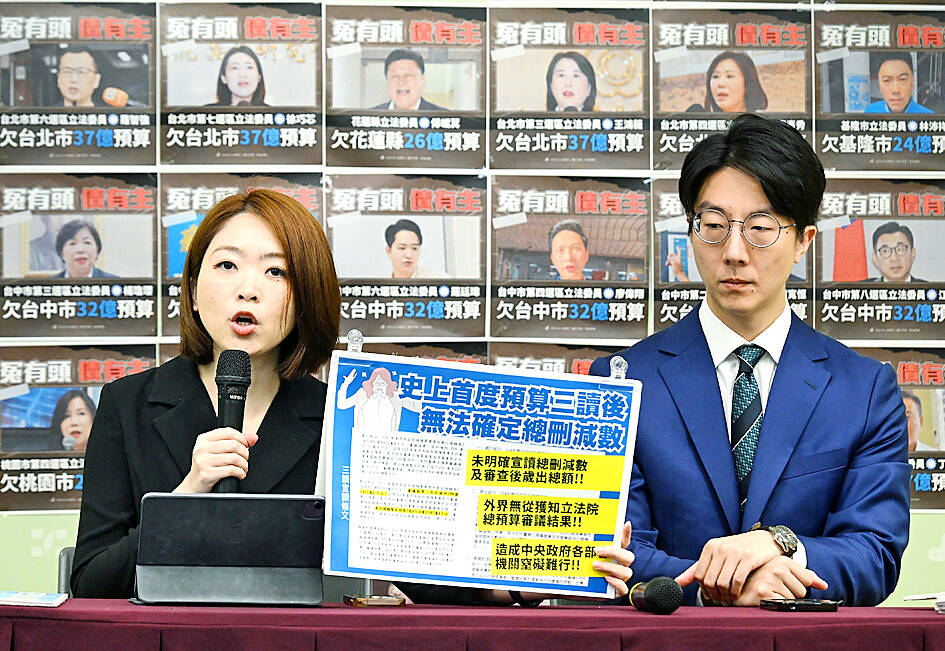City mayors and county commissioners complaining about the central government cutting subsidies to local governments should blame opposition lawmakers who “recklessly” slashed the central government’s fiscal budget, Democratic Progressive Party (DPP) spokespeople said yesterday.
Since last year, Chinese Nationalist Party (KMT) and Taiwan People’s Party (TPP) lawmakers have created political turmoil by joining forces in an attempt to expand the opposition-
controlled legislature’s power and undermine the executive branch, DPP spokeswoman Han Ying (韓瑩) said.

Photo: Liao Chen-hui, Taipei Times
“They also recklessly slashed NT$207.6 billion [US$6.94 billion] from the fiscal budget, including NT$63.6 billion, which they left to the Cabinet to find ways to cut,” she said.
Throughout the budget review, KMT and TPP lawmakers had resorted to violence, refused to hold discussions with and obstructed DPP members from attending legislative sessions, and submitted last-minute motions with few lawmakers knowing what they contained, Han said.
After ramming these motions through their third readings, even KMT and TPP lawmakers had no idea what budget items or how much they had cut, she said.
“It is the first time this has happened in Taiwan’s history — having lawmakers who did not know what they were voting on or what funds were being slashed,” she said.
It has resulted in a budget shortfall, made it difficult for government agencies to function, eliminated social welfare programs and the Cabinet implementing a 25 percent across-the-board cut in subsidies to local governments, Han said.
“Now the city mayors and county commissioners, the majority of whom are KMT members or affiliated with the blue camp, are crying foul, and accusing the central government of being unfair, bad at fiscal management or unlawfully seizing subsidy funds,” she said. “However, the root cause of all of these is the work of the KMT and the TPP in the legislature.”
During the tenures of former presidents Ma Ying-jeou (馬英九) and Tsai Ing-wen (蔡英文) from 2009 to last year, the proposed fiscal budget was, on average, cut by 1.19 percent by lawmakers, or 1.1 percent from 2022 to last year, but for this year, the legislature slashed it by a record 6.63 percent, DPP spokesman Justin Wu (吳崢) said.
“Opposition parties slashed NT$63.6 billion from the Executive Yuan’s operating funds, so it has to make up for it by reducing subsidies to local governments,” he said.
The Cabinet still has to manage ongoing programs, including a four-year NT$40 billion program to enhance walkways for pedestrian safety, a four-year NT$30 billion housing rental subsidy program, the five-year NT$48.9 billion Healthy Taiwan Cultivation Plan, and NT$11.6 billion in stimulus programs for small and medium-sized businesses, he said.
“They are all very important,” he said. “Which ones do the opposition parties want to see cut?”

Three Taiwanese airlines have prohibited passengers from packing Bluetooth earbuds and their charger cases in checked luggage. EVA Air and Uni Air said that Bluetooth earbuds and charger cases are categorized as portable electronic devices, which should be switched off if they are placed in checked luggage based on international aviation safety regulations. They must not be in standby or sleep mode. However, as charging would continue when earbuds are placed in the charger cases, which would contravene international aviation regulations, their cases must be carried as hand luggage, they said. Tigerair Taiwan said that earbud charger cases are equipped

Foreign travelers entering Taiwan on a short layover via Taiwan Taoyuan International Airport are receiving NT$600 gift vouchers from yesterday, the Tourism Administration said, adding that it hopes the incentive would boost tourism consumption at the airport. The program, which allows travelers holding non-Taiwan passports who enter the country during a layover of up to 24 hours to claim a voucher, aims to promote attractions at the airport, the agency said in a statement on Friday. To participate, travelers must sign up on the campaign Web site, the agency said. They can then present their passport and boarding pass for their connecting international

UNILATERAL MOVES: Officials have raised concerns that Beijing could try to exert economic control over Kinmen in a key development plan next year The Civil Aviation Administration (CAA) yesterday said that China has so far failed to provide any information about a new airport expected to open next year that is less than 10km from a Taiwanese airport, raising flight safety concerns. Xiamen Xiangan International Airport is only about 3km at its closest point from the islands in Kinmen County — the scene of on-off fighting during the Cold War — and construction work can be seen and heard clearly from the Taiwan side. In a written statement sent to Reuters, the CAA said that airports close to each other need detailed advanced

The age requirement for commercial pilots and airline transport pilots is to be lowered by two years, to 18 and 21 years respectively, to expand the pool of pilots in accordance with international standards, the Ministry of Transportation and Communications announced today. The changes are part of amendments to articles 93, 119 and 121 of the Regulations Governing Licenses and Ratings for Airmen (航空人員檢定給證管理規則). The amendments take into account age requirements for aviation personnel certification in the Convention on International Civil Aviation and EU’s aviation safety regulations, as well as the practical needs of managing aviation personnel licensing, the ministry said. The ministry